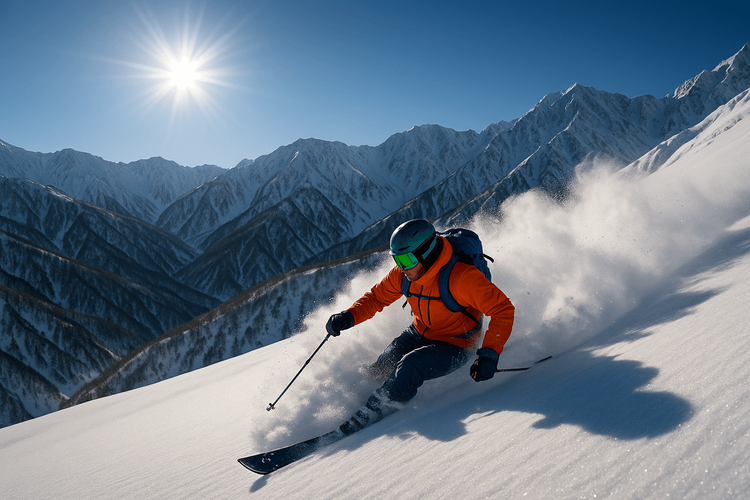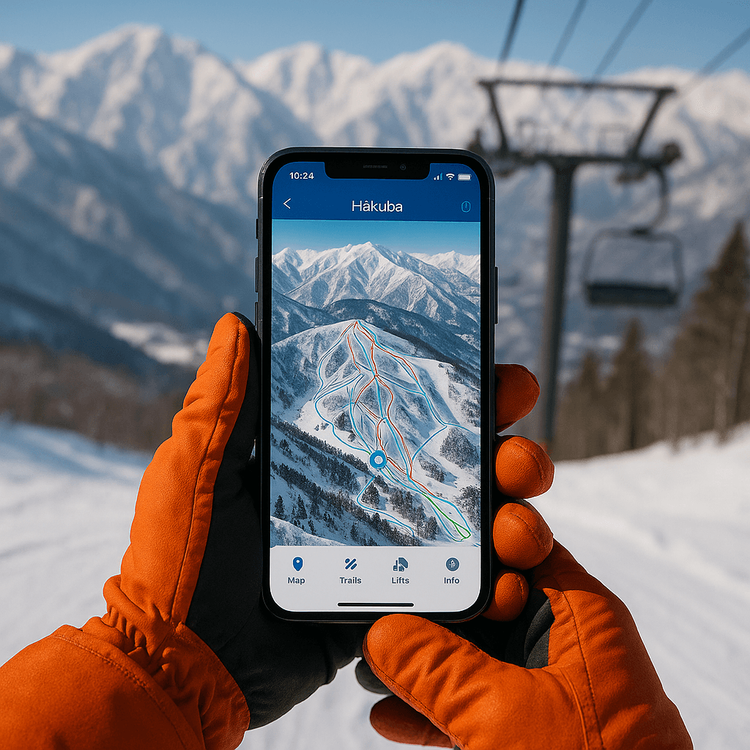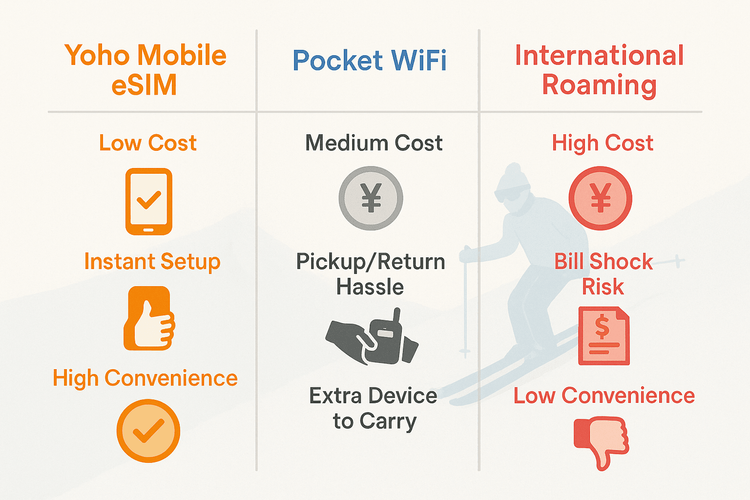Sciare a Hakuba con un Budget Limitato: Guida di Viaggio in Giappone per Backpacker
Bruce Li•Sep 18, 2025
La leggendaria “Japow”—quella neve fresca, leggera, profonda e apparentemente infinita—è un richiamo irresistibile per sciatori e snowboarder di tutto il mondo. Sebbene molti associno un viaggio invernale in Giappone a un costo elevato, la verità è che puoi vivere questo paradiso innevato senza svuotare il portafoglio. Dimentica per un attimo i resort sfarzosi e costosi. Ti portiamo nel cuore delle Alpi giapponesi: la Hakuba Valley.
Questa guida, distillata dalla saggezza di sciatori esperti e frequentatori di forum, è la tua mappa per un’epica avventura sciistica da backpacker a Hakuba. Tratteremo di tutto, dai trucchi per i trasporti agli alloggi convenienti e, soprattutto, a come rimanere connessi in montagna per la navigazione e per storie epiche su Instagram. Prima ancora di prenotare il volo, perché non scoprire quanto può essere facile la connettività? Prova il nostro servizio con una eSIM di prova gratuita e assapora la fluidità dei dati di viaggio.

Hakuba vs. Niseko: La Scelta del Backpacker attento al Budget
Quando si pianifica un viaggio sulla neve in Giappone, il primo grande dibattito è spesso Hakuba vs. Niseko. Mentre Niseko, sull’isola settentrionale di Hokkaido, è famosa in tutto il mondo per la sua neve incredibile e la sua vivace scena internazionale, spesso ha un prezzo più elevato. Per il backpacker attento al budget, Hakuba, situata nella Prefettura di Nagano, rappresenta un’alternativa convincente.
- Accessibilità e Costo: Hakuba è significativamente più facile ed economica da raggiungere da Tokyo. Un autobus diretto può portarti lì in circa 5 ore a una frazione del costo di un volo e trasferimento a Niseko. Questo risparmio sui trasporti è un enorme vantaggio per qualsiasi viaggio sciistico da backpacker.
- Varietà di Terreni: Hakuba non è un singolo resort ma una valle con dieci comprensori, tra cui Happo-One (sede delle Olimpiadi Invernali del 1998), Goryu e Cortina. Ciò offre un’enorme varietà di terreni accessibili con un unico Hakuba Valley Pass, adatto a tutti i livelli di abilità.
- Atmosfera Autentica: Pur essendo accogliente con gli stranieri, Hakuba conserva un’atmosfera giapponese più autentica. Troverai più lodge a conduzione familiare e izakaya tradizionali, che offrono un’esperienza culturale più ricca oltre allo sci incredibile.
Per un backpacker, la combinazione di costi di accesso inferiori, terreni diversificati e un’atmosfera più locale rende Hakuba il chiaro vincitore.
Raggiungere Hakuba senza Svuotare il Portafoglio
La tua prima grande opportunità di risparmio è il viaggio dagli aeroporti di Tokyo (Narita o Haneda) alle piste. Il modo più economico per arrivare a Hakuba da Tokyo è quasi sempre con l’autobus autostradale.
- Autobus Autostradale (Il più economico): Diverse compagnie, come il Nagano Snow Shuttle, offrono rotte dirette dall’aeroporto o dal terminal degli autobus di Shinjuku fino a Hakuba. Il viaggio dura 5-6 ore ma è comodo ed economico, spesso a meno della metà del prezzo del treno. Prenota in anticipo online, specialmente durante l’alta stagione.
- Shinkansen (Treno Proiettile) + Autobus (L’opzione veloce): Se hai poco tempo, prendi lo Hokuriku Shinkansen dalla stazione di Tokyo a Nagano (circa 90 minuti). Dalla stazione di Nagano, un autobus locale ti porterà negli ultimi 60-75 minuti fino a Hakuba. Sebbene più veloce, questa opzione è considerevolmente più costosa. Controlla la guida ufficiale Japan-Guide per i dettagli sui trasporti.
Risparmi Intelligenti: Skipass, Attrezzatura e Alloggio
Una volta arrivato nella valle, scelte intelligenti possono far durare di più i tuoi yen.
Hakuba Valley Pass e Noleggio Attrezzatura
L’Hakuba Valley Pass è il tuo biglietto d’oro, che ti dà accesso agli impianti di risalita di dieci diversi resort. Acquistare un pass plurigiornaliero è quasi sempre più economico dei biglietti singoli. Cerca le vendite anticipate online prima dell’inizio della stagione. Per l’attrezzatura, evita di noleggiare direttamente alla base dei resort più grandi. Negozi più piccoli e indipendenti nei villaggi di Echoland o Goryu offrono spesso tariffe migliori e pacchetti vantaggiosi.
Alloggi per Backpacker
Hakuba è disseminata di ostelli e lodge per backpacker che sono sia socievoli che convenienti. Aree come Echoland sono hub popolari con un buon mix di alloggi economici, ristoranti e bar. Un consiglio da professionisti è soggiornare in un posto con una cucina condivisa, che ti permette di cucinare alcuni pasti e risparmiare una fortuna sui ristoranti. Controlla siti come Hostelworld per trovare i posti meglio recensiti da altri viaggiatori affamati di neve fresca.
Resta Connesso sulle Piste: L’Essenziale del Backpacker Moderno
In passato, rimanere connessi in montagna significava costosi roaming o ingombranti dispositivi Wi-Fi portatili. Oggi, una eSIM è lo strumento definitivo per uno sciatore. Hai bisogno di dati per navigare tra i vasti resort di Hakuba, controllare le ultime previsioni neve, trovare i tuoi amici o fare una chiamata d’emergenza. Affidarsi al Wi-Fi discontinuo del resort non è un’opzione quando sei nel mezzo di una conca di neve fresca.
È qui che Yoho Mobile trasforma il tuo viaggio. Invece di affrontare tariffe di roaming esorbitanti, puoi installare una eSIM per viaggiare in Giappone prima ancora di partire da casa. Nel momento in cui atterri, sei connesso.

I nostri piani flessibili ti permettono di acquistare esattamente i dati di cui hai bisogno per la durata del tuo viaggio, che sia una settimana o un mese. In più, con la tranquillità di Yoho Care, non rimani mai veramente isolato. Anche se esaurisci i tuoi dati ad alta velocità, ti garantiamo una connettività di base per le necessità essenziali come mappe e messaggistica.

Configurarla è semplice. Per gli utenti iOS, è un’installazione con un solo clic, senza bisogno di codici QR. Basta acquistare, toccare ‘Installa’ e hai finito in meno di un minuto. Per tutti gli altri dispositivi, basta una rapida scansione QR. Prima di partire, è sempre una buona idea controllare la nostra lista di dispositivi compatibili con eSIM, regolarmente aggiornata, per assicurarti che il tuo telefono sia pronto per l’avventura.
Domande Frequenti (FAQ)
D: Qual è la migliore eSIM per sciare in Giappone?
R: La migliore eSIM per sciare in Giappone offre una copertura affidabile nelle regioni montuose come Nagano, pacchetti dati flessibili e un prezzo accessibile. Yoho Mobile fornisce una solida copertura in tutto il Giappone e offre piani personalizzabili perfetti per un viaggio sciistico da backpacker, garantendoti dati per la navigazione e la sicurezza senza i costi elevati del roaming.
D: Sciare a Hakuba è costoso per un backpacker?
R: Non deve esserlo per forza! Scegliendo trasporti economici come l’autobus autostradale, alloggiando in ostelli con cucina, acquistando skipass plurigiornalieri ed evitando i costosi ristoranti in quota, puoi goderti la neve di fama mondiale di Hakuba con un budget limitato.
D: Qual è il modo più economico per andare da Tokyo a Hakuba?
R: L’opzione più economica è l’autobus autostradale diretto da Shinjuku o dagli aeroporti di Tokyo (Narita/Haneda). È significativamente più economico dello Shinkansen (treno proiettile) e ti porta direttamente nella valle, facendoti risparmiare denaro e problemi di trasferimento.
D: Di quanti dati ho bisogno per un viaggio sulla neve in Giappone?
R: Per un viaggio di una settimana, un piano da 5-10 GB è solitamente sufficiente per la navigazione, i social media e le comunicazioni. Se prevedi di guardare video in streaming o fare molte videochiamate, considera un piano più grande. Con le opzioni flessibili di Yoho Mobile, puoi scegliere ciò che è giusto per te e ricaricare facilmente se necessario.
Conclusione: Traccia la Tua Linea a Hakuba
La Hakuba Valley dimostra che una leggendaria avventura sulla neve fresca giapponese è alla portata di qualsiasi backpacker. Con una pianificazione strategica, una spesa intelligente e gli strumenti giusti, puoi immergerti nella cultura e sulle piste delle Alpi giapponesi. Non lasciare che la connettività sia un pensiero secondario. Una eSIM non è solo una comodità; è un pezzo essenziale dell’equipaggiamento da viaggio moderno che offre sicurezza, libertà e connessione.
Pronto a solcare la “Japow”? Equipaggiati con dati senza interruzioni per la tua avventura. Esplora i piani eSIM convenienti di Yoho Mobile per il Giappone e trasforma in realtà il tuo viaggio sulla neve da sogno.
